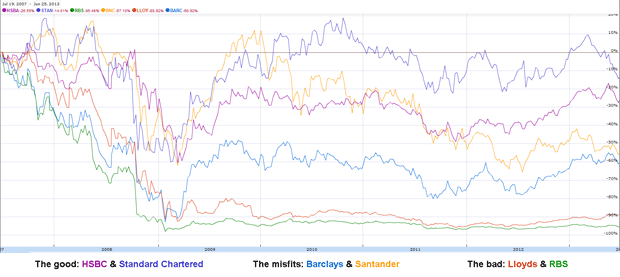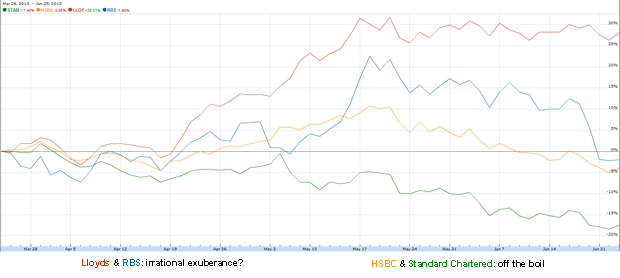Get the latest financial news, insights and expert analysis from our award-winning MoneyWeek team, to help you understand what really matters when it comes to your finances.
You are now subscribed
Your newsletter sign-up was successful
Want to add more newsletters?

Twice daily
MoneyWeek
Get the latest financial news, insights and expert analysis from our award-winning MoneyWeek team, to help you understand what really matters when it comes to your finances.

Four times a week
Look After My Bills
Sign up to our free money-saving newsletter, filled with the latest news and expert advice to help you find the best tips and deals for managing your bills. Start saving today!
When it comes to banks, nothing seems shocking anymore. But the secret tapes released this week revealing top Anglo Irish bank executives laughing and joking about hoodwinking the Irish regulator and its central bank are surely beyond the pale. Irish citizens are up in arms... and it's little wonder the Irish prime minister has ordered an official investigation.
What previously seemed to be a conspiracy theory is now looking like awful fact. The big three Irish banks effectively bankrupted the nation, leaving it with debilitating debts and in hock for a generation. And the real choker is that the banking chiefs seemingly knew exactly how deadly their actions would be. Not that they let anyone else know... oh no, then they may not have got the bail-outs they so desperately needed!
Having stirred up this whole hornets' nest, and with the markets teetering again, I reckon it's about time we re-examined our own banks.
MoneyWeek
Subscribe to MoneyWeek today and get your first six magazine issues absolutely FREE

Sign up to Money Morning
Don't miss the latest investment and personal finances news, market analysis, plus money-saving tips with our free twice-daily newsletter
Don't miss the latest investment and personal finances news, market analysis, plus money-saving tips with our free twice-daily newsletter
After all, the financial crisis left some of our own execs looking equally culpable and equally useless. And in the event of another banking crisis, we now know that the authorities won't be quite as eager to pawn the nation's wealth.
With the big four British banks struggling to conceal absolutely massive losses, there could be a lot of trouble ahead. And as we'll see today, placing the right bet on the outcome could prove very profitable indeed...
Why bank executives lie
The banking industry is so vital that at times of stress, nobody really wants to dig too deep to find out the truth. After all, we're all totally reliant on these institutions. When it comes to it, executives lie and the authorities are all too willing to look the other way.
First, nobody knows the extent of the liabilities. Having listened to the incriminating tapes,what struck me most was just how little the top bosses seemed to know about their own bank and the size of bad debt involved.
The truth is, banking losses are unknowable. Yet, the banks are expected to somehow project the amount of loans that are likely to go bad in the future and write them down accordingly. In Anglo's case, the figure they picked was €7bn. This had nothing to do with economic reality; the reality was that the final figure ended up being around €30bn. The figure they picked was one high enough to cause the authorities to panic, but not high enough to let them see the bank go to the wall.
Second, nobody wants to face the losses. Even if the banks could make a realistic stab at estimating likely losses, the chances are they won't reveal their musings. That's because the worse things look, the more likely the regulators are to call a halt to things. In the light of large losses eating into a bank's capital, the regulator will insist on draconian action. A fund-raising could all but wipe out shareholders... and in the worst cases, lead to nationalisation, or even bankruptcy.
Third, any bank could go down. Following deregulation, the banking industry went big. Most banks are now vast, diversified enterprises. Each is unique with a unique risk profile. Nobody can know how the different elements of the bank will react with each other in a crisis. In the past, many of the banks' risk models came out lacking... MF Global and Lehman for instance. But then again, in other cases, the big boys proved more robust. In the UK and Spain, for instance, among the worst hit were the small, local deposit banks. The banks' risk models are, in effect, completely untested... until it comes down to it, nobody knows how they will fare.
Fourth, you can't control the markets. The most important thing a bank can't control is market perceptionand therefore the market's willingness to lend them money. The banking game is ultimately one of confidence. Lose investor confidence and you're done for. That's why they need to maintain a healthy amount of secrecy and deceit. You never reveal your weakness, and you always talk your book.
Which UK banks are lying now?
There are six big banking groups listed in the UK. By my reckoning, there's reason to believe that some are deeper into the deceit game than others.The point is, it's going to do you a lot of good to find out which banks are in trouble right now. I like to think of our big six in terms of pairs. The bad, the misfits, and the (relatively) good. Here's a chart that shows why:
Performance of the UK's big banks since the crisis

(Click on the chart for a larger version)
Since the outbreak of the financial crisis, the likes of HSBC and Standard Chartered have only' lost some 15-25% of their value. Not great... but in a banking crisis, I'll be generous and call it good.Lloyds and RBS, on the other hand, have really suffered... or at least their shareholders have, having lost somewhere between 90% and 95%. I'm going to say that's bad.
But then there are the misfits. Barclays and Santander have trodden the middle path in terms of shareholder losses. Barclays took its bail-outs privately and as a global player was able to leverage its position to pick up some of Lehman's operations after it went down. Banco Santander is also a large, global player with a big presence in emerging markets. It's really only included in the UK as a legacy of its takeover of Abbey National.
For the purposes of my analysis, I'm going to exclude the misfits and concentrate on the good and the bad. Here's a chart that shows their performance over the last three months. As you can see, there's been somewhat of a role reversal...
The good and the bad banks over the last quarter

(Click on the chart for a larger version)
I've chosen this three-month period, because it was then that I penned an article titled "It's all over for bank stocks "...
At the time, I said I'd update you in due course about what action I would be taking to profit from the misery that could be about to afflict the industry (again!)
Well, I've bided my time. I've watched the bad banks outperform the good (just look at the fantastic near 30% uplift in Lloyds!) and now I'm ready to place my bet.
In my next article, I'll show you why I think now could be the time to place what's known as a pairs' trade. It's time to go long the good and short the bad deceitful banks.
Get the latest financial news, insights and expert analysis from our award-winning MoneyWeek team, to help you understand what really matters when it comes to your finances.
MoneyWeek is written by a team of experienced and award-winning journalists, plus expert columnists. As well as daily digital news and features, MoneyWeek also publishes a weekly magazine, covering investing and personal finance. From share tips, pensions, gold to practical investment tips - we provide a round-up to help you make money and keep it.
-
 How to navigate the inheritance tax paperwork maze in nine clear steps
How to navigate the inheritance tax paperwork maze in nine clear stepsFamilies who cope best with inheritance tax (IHT) paperwork are those who plan ahead, say experts. We look at all documents you need to gather, regardless of whether you have an IHT bill to pay.
-
 Should you get financial advice when organising care for an elderly relative?
Should you get financial advice when organising care for an elderly relative?A tiny proportion of over 45s get help planning elderly relatives’ care – but is financial advice worth the cost?

